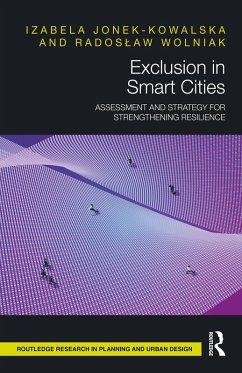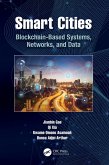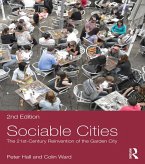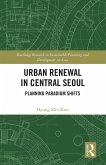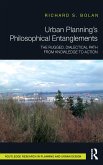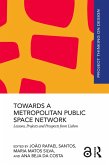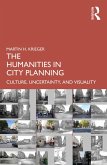Izabela Jonek-Kowalska, Radoslaw Wolniak
Exclusion in Smart Cities (eBook, ePUB)
Assessment and Strategy for Strengthening Resilience
42,95 €
42,95 €
inkl. MwSt.
Erscheint vor. 18.03.25

21 °P sammeln
42,95 €
Als Download kaufen

42,95 €
inkl. MwSt.
Erscheint vor. 18.03.25

21 °P sammeln
Jetzt verschenken
Alle Infos zum eBook verschenken
42,95 €
inkl. MwSt.
Erscheint vor. 18.03.25
Alle Infos zum eBook verschenken

21 °P sammeln
Unser Service für Vorbesteller - Ihr Vorteil ohne Risiko:
Sollten wir den Preis dieses Artikels vor dem Erscheinungsdatum senken, werden wir Ihnen den Artikel bei der Auslieferung automatisch zum günstigeren Preis berechnen.
Sollten wir den Preis dieses Artikels vor dem Erscheinungsdatum senken, werden wir Ihnen den Artikel bei der Auslieferung automatisch zum günstigeren Preis berechnen.
Izabela Jonek-Kowalska, Radoslaw Wolniak
Exclusion in Smart Cities (eBook, ePUB)
Assessment and Strategy for Strengthening Resilience
- Format: ePub
- Merkliste
- Auf die Merkliste
- Bewerten Bewerten
- Teilen
- Produkt teilen
- Produkterinnerung
- Produkterinnerung

Bitte loggen Sie sich zunächst in Ihr Kundenkonto ein oder registrieren Sie sich bei
bücher.de, um das eBook-Abo tolino select nutzen zu können.
Hier können Sie sich einloggen
Hier können Sie sich einloggen
Sie sind bereits eingeloggt. Klicken Sie auf 2. tolino select Abo, um fortzufahren.

Bitte loggen Sie sich zunächst in Ihr Kundenkonto ein oder registrieren Sie sich bei bücher.de, um das eBook-Abo tolino select nutzen zu können.
Smart cities are fascinating, but they also have a dark side that little is said or written about. One issue is the possibility of generating various types of exclusion. For this reason, this book will develop principles for assessing the inclusiveness of smart cities and outlines strategies for strengthening urban resistance to exclusion.
- Geräte: eReader
- mit Kopierschutz
- eBook Hilfe
- Größe: 2.38MB
Andere Kunden interessierten sich auch für
![Smart Cities (eBook, ePUB) Smart Cities (eBook, ePUB)]() Jianbin GaoSmart Cities (eBook, ePUB)48,95 €
Jianbin GaoSmart Cities (eBook, ePUB)48,95 €![Sociable Cities (eBook, ePUB) Sociable Cities (eBook, ePUB)]() Peter HallSociable Cities (eBook, ePUB)57,95 €
Peter HallSociable Cities (eBook, ePUB)57,95 €![Mobilizing Food Vending (eBook, ePUB) Mobilizing Food Vending (eBook, ePUB)]() Ginette WesselMobilizing Food Vending (eBook, ePUB)39,95 €
Ginette WesselMobilizing Food Vending (eBook, ePUB)39,95 €![Urban Renewal in Central Seoul (eBook, ePUB) Urban Renewal in Central Seoul (eBook, ePUB)]() Hyung Min KimUrban Renewal in Central Seoul (eBook, ePUB)42,95 €
Hyung Min KimUrban Renewal in Central Seoul (eBook, ePUB)42,95 €![Urban Planning's Philosophical Entanglements (eBook, ePUB) Urban Planning's Philosophical Entanglements (eBook, ePUB)]() Richard S BolanUrban Planning's Philosophical Entanglements (eBook, ePUB)53,95 €
Richard S BolanUrban Planning's Philosophical Entanglements (eBook, ePUB)53,95 €![Towards a Metropolitan Public Space Network (eBook, ePUB) Towards a Metropolitan Public Space Network (eBook, ePUB)]() Towards a Metropolitan Public Space Network (eBook, ePUB)42,95 €
Towards a Metropolitan Public Space Network (eBook, ePUB)42,95 €![The Humanities in City Planning (eBook, ePUB) The Humanities in City Planning (eBook, ePUB)]() Martin KriegerThe Humanities in City Planning (eBook, ePUB)39,95 €
Martin KriegerThe Humanities in City Planning (eBook, ePUB)39,95 €-
-
-
Smart cities are fascinating, but they also have a dark side that little is said or written about. One issue is the possibility of generating various types of exclusion. For this reason, this book will develop principles for assessing the inclusiveness of smart cities and outlines strategies for strengthening urban resistance to exclusion.
Dieser Download kann aus rechtlichen Gründen nur mit Rechnungsadresse in A, B, BG, CY, CZ, D, DK, EW, E, FIN, F, GR, HR, H, IRL, I, LT, L, LR, M, NL, PL, P, R, S, SLO, SK ausgeliefert werden.
Produktdetails
- Produktdetails
- Verlag: Taylor & Francis eBooks
- Erscheinungstermin: 18. März 2025
- Englisch
- ISBN-13: 9781040331910
- Artikelnr.: 73154068
- Verlag: Taylor & Francis eBooks
- Erscheinungstermin: 18. März 2025
- Englisch
- ISBN-13: 9781040331910
- Artikelnr.: 73154068
- Herstellerkennzeichnung Die Herstellerinformationen sind derzeit nicht verfügbar.
Izabela Jonek-Kowalska is Full Professor in the Department of Economics and Computer Sciences at Silesian University of Technology, Poland. For over 23 years she has been dealing with the economics of business entities, including finance and management of Smart Cities. Her research output includes over 400 publications with national and international publishers, as well as many undertakings and projects implemented in cooperation with the business environment. Izabela's research interests include finance of business entities, Smart City risk management, and municipal and industrial economics.
Radoslaw Wolniak is Full Professor in the Department of Economics and Informatics at Silesian University of Technology, Poland. For over 24 years he has been dealing with the issues of management, including Industry 4.0, Smart City, digitalization, and artificial intelligence. His scientific achievements include over 600 publications with national and international publishers, as well as many undertakings and projects implemented in cooperation with the business environment. Radoslaw's research interests include management, Smart Cities, Industry 4.0, digitalization, innovativeness and artificial intelligence.
Radoslaw Wolniak is Full Professor in the Department of Economics and Informatics at Silesian University of Technology, Poland. For over 24 years he has been dealing with the issues of management, including Industry 4.0, Smart City, digitalization, and artificial intelligence. His scientific achievements include over 600 publications with national and international publishers, as well as many undertakings and projects implemented in cooperation with the business environment. Radoslaw's research interests include management, Smart Cities, Industry 4.0, digitalization, innovativeness and artificial intelligence.
List of figures
List of tables
Introduction
1. The concept of a Smart City (SC) in modern economies
1.1. Creation and assumptions of the Smart City concept
1.2. Areas of Smart City development and evaluation
2. Bright and dark sides of Smart City
2.1. The role of Smart City in improving the quality of urban life
2.2. Criticism of the Smart City concept on the literature on the subject
3. Smart City governance
3.1. The role of city authorities in creating smart cities
3.2. The Smart City concept in the strategies of the cities of Central and
Eastern Europe
4. The issue of exclusion in Smart City rankings
4.1. Characteristics of Smart City rankings
4.2. Assessment of areas and indicators of exclusion in selected Smart City
rankings
5. Exclusivity and inclusiveness of Smart City in practice
5.1. Leaders and losers of inclusiveness in Smart City
5.2. Smart City inclusiveness best practices: case studies
6. Proposal for assessing the inclusiveness of Smart City
6.1. Areas and principles of measuring inclusiveness
6.2. Concept of the Smart City inclusiveness assessment
7. Long-term strategy for strengthening inclusiveness in the Smart City
7.1. Identification of future trends in exclusion in the Smart City
7.2. Strategy to strengthen resistance to exclusions in the Smart City
8. Inclusiveness versus exclusivity: discussion and conclusions
8.1. Discussion in the light of current research and practices
8.2. Summary, research limitations, and directions for further research
Conclusion
Index
List of tables
Introduction
1. The concept of a Smart City (SC) in modern economies
1.1. Creation and assumptions of the Smart City concept
1.2. Areas of Smart City development and evaluation
2. Bright and dark sides of Smart City
2.1. The role of Smart City in improving the quality of urban life
2.2. Criticism of the Smart City concept on the literature on the subject
3. Smart City governance
3.1. The role of city authorities in creating smart cities
3.2. The Smart City concept in the strategies of the cities of Central and
Eastern Europe
4. The issue of exclusion in Smart City rankings
4.1. Characteristics of Smart City rankings
4.2. Assessment of areas and indicators of exclusion in selected Smart City
rankings
5. Exclusivity and inclusiveness of Smart City in practice
5.1. Leaders and losers of inclusiveness in Smart City
5.2. Smart City inclusiveness best practices: case studies
6. Proposal for assessing the inclusiveness of Smart City
6.1. Areas and principles of measuring inclusiveness
6.2. Concept of the Smart City inclusiveness assessment
7. Long-term strategy for strengthening inclusiveness in the Smart City
7.1. Identification of future trends in exclusion in the Smart City
7.2. Strategy to strengthen resistance to exclusions in the Smart City
8. Inclusiveness versus exclusivity: discussion and conclusions
8.1. Discussion in the light of current research and practices
8.2. Summary, research limitations, and directions for further research
Conclusion
Index
List of figures
List of tables
Introduction
1. The concept of a Smart City (SC) in modern economies
1.1. Creation and assumptions of the Smart City concept
1.2. Areas of Smart City development and evaluation
2. Bright and dark sides of Smart City
2.1. The role of Smart City in improving the quality of urban life
2.2. Criticism of the Smart City concept on the literature on the subject
3. Smart City governance
3.1. The role of city authorities in creating smart cities
3.2. The Smart City concept in the strategies of the cities of Central and
Eastern Europe
4. The issue of exclusion in Smart City rankings
4.1. Characteristics of Smart City rankings
4.2. Assessment of areas and indicators of exclusion in selected Smart City
rankings
5. Exclusivity and inclusiveness of Smart City in practice
5.1. Leaders and losers of inclusiveness in Smart City
5.2. Smart City inclusiveness best practices: case studies
6. Proposal for assessing the inclusiveness of Smart City
6.1. Areas and principles of measuring inclusiveness
6.2. Concept of the Smart City inclusiveness assessment
7. Long-term strategy for strengthening inclusiveness in the Smart City
7.1. Identification of future trends in exclusion in the Smart City
7.2. Strategy to strengthen resistance to exclusions in the Smart City
8. Inclusiveness versus exclusivity: discussion and conclusions
8.1. Discussion in the light of current research and practices
8.2. Summary, research limitations, and directions for further research
Conclusion
Index
List of tables
Introduction
1. The concept of a Smart City (SC) in modern economies
1.1. Creation and assumptions of the Smart City concept
1.2. Areas of Smart City development and evaluation
2. Bright and dark sides of Smart City
2.1. The role of Smart City in improving the quality of urban life
2.2. Criticism of the Smart City concept on the literature on the subject
3. Smart City governance
3.1. The role of city authorities in creating smart cities
3.2. The Smart City concept in the strategies of the cities of Central and
Eastern Europe
4. The issue of exclusion in Smart City rankings
4.1. Characteristics of Smart City rankings
4.2. Assessment of areas and indicators of exclusion in selected Smart City
rankings
5. Exclusivity and inclusiveness of Smart City in practice
5.1. Leaders and losers of inclusiveness in Smart City
5.2. Smart City inclusiveness best practices: case studies
6. Proposal for assessing the inclusiveness of Smart City
6.1. Areas and principles of measuring inclusiveness
6.2. Concept of the Smart City inclusiveness assessment
7. Long-term strategy for strengthening inclusiveness in the Smart City
7.1. Identification of future trends in exclusion in the Smart City
7.2. Strategy to strengthen resistance to exclusions in the Smart City
8. Inclusiveness versus exclusivity: discussion and conclusions
8.1. Discussion in the light of current research and practices
8.2. Summary, research limitations, and directions for further research
Conclusion
Index
